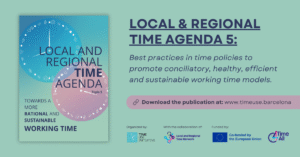- First meeting of the Time Use Initiative with Members of the European Parliament in Strasbourg to set a roadmap to promote the right to time and end with biannual clock change in Europe
- This is the first time a specific meeting on time policies is being held at the European Parliament, marking a historic milestone in setting the debate on these policies at the European level.
- The meeting is part of the strategy to put the right to time on the agenda of the new EU mandate, as well as the Time Use Initiative delegation’s participation in a European Economic and Social Committee expert hearing in Brussels.
The meeting with Members of the European Parliament, taking place on 28 November in Strasbourg, was the follow-up to the EU Manifesto on Time Policies Tick-tock Europe, launched during the last European Parliament Elections and identifying 12 key actions that could be implemented by the EU from 2024 onwards to ensure the right to time for all European citizens, the main one being establishing a roadmap to eliminate clock changes by 2026.
Some of the MEPs who endorsed the Tick-Tock Europe Manifesto plus others committed to ending the biannual clock changes in the EU took part in the meeting, where three main actions were decided:
- Working on a roadmap to end seasonal clock changes (DST)
- The creation of a permanent working group of MEPs involved in the promotion of the right to time
- Preparation of a European Parliament resolution on the right to time for all European citizens
According to Marta Junque, director of TUI, the meeting’s outcome was positive. “It’s a step forward to ensure the right to time for all European citizens”
The meeting took place in parallel to the main events organised last week by the Metropolitan City of Strasbourg as the World Capital of Time 2024, and it counted the participation of Marina Lafay. It was co-chaired by MEP Lina Galvez and MEP Diana Riba.







